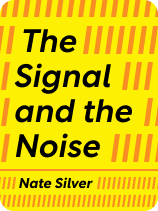

This article is an excerpt from the Shortform book guide to "The Signal and the Noise" by Nate Silver. Shortform has the world's best summaries and analyses of books you should be reading.
Like this article? Sign up for a free trial here.
What are the challenges of forecasting? How has political and social fragmentation made forecasting harder?
Today, many forecasters are facing extreme difficulty in doing their jobs. Nate Silver believes there are two reasons for this. First, people are being encouraged to sort themselves into insular groups. Second, our trust in experts is at an all-time low.
Let’s look at why Silver believes forecasters can’t do their job accurately anymore.
Two Challenges for Today’s Forecasters
Although Silver maintains that his suggestions can improve the quality of our predictions, he cautions that it’s more difficult than ever to translate better prediction theory into better predictions in practice. We’ve already discussed one reason for that: namely, that contemporary technology forces us to wade through more noise to find meaningful signal. But Silver also argues that since the late 2010s, unprecedented political and social fragmentation have made prediction even harder. We’ll discuss how these challenges of forecasting have made forecasters’ jobs harder by decreasing the diversity of thought and eroding public trust in expert advice.
Challenge #1: Increasingly Insular Groups
One problem for contemporary forecasters, according to Silver, is that contemporary news and social media encourage people to sort themselves into like-minded subgroups, which harms predictions by encouraging herd mentality and quashing opposing views. According to Silver, the best predictions often come when we combine diverse, independent viewpoints in order to consider a problem from all angles. Conversely, when you only listen to people who think the way you do, you’re likely to simply reinforce what you already believe—which isn’t a recipe for good predictions.
(Shortform note: In Think Again, Adam Grant suggests countering this insularity through reconsideration—a process of deliberately questioning and challenging your beliefs. According to Grant, one of the keys to reconsideration is to actively seek out opposing views and genuinely attempt to understand them. Doing so, he says, makes your understanding of the world more complex and helps you avoid the kinds of stereotypes that so easily develop in the “us versus them” atmosphere of the like-minded groups Silver describes.)
Challenge #2: The Erosion of Trust
Moreover, Silver argues, the same factors that have led to more insular, polarized groups have also led many people to dismiss opinions that come from outside of the group’s narrow consensus. One effect of this trend is that people trust public institutions and expert opinions less than ever before, which creates a climate in which people tend to dismiss accurate—and urgent—predictions, sometimes without clear reasons. He gives the example of the 2020 outbreak of Covid-19, when a significant number of people dismissed expert predictions about the virus’s likely spread and impact and, as a result, ignored or pushed back against the recommended public health protocols.
(Shortform note: The reasons that people ignore expert opinions may go deeper than recent political polarization. For example, some studies suggest that inherent distrust of experts isn’t necessarily linked to belonging to a specific ideological group as Silver suggests. Nor is it a new problem: Historian Richard Hofstadter wrote about ambivalence toward expertise in US culture as early as 1963. Moreover, it’s possible that humans are simply prone to doing the opposite of what they’re told—behavioral scientists point out that we’re susceptible to a type of behavior called reactance, which involves acting contrarily when we perceive threats to our individual freedom—such as when we’re asked to wear masks or avoid public gatherings.)

———End of Preview———
Like what you just read? Read the rest of the world's best book summary and analysis of Nate Silver's "The Signal and the Noise" at Shortform.
Here's what you'll find in our full The Signal and the Noise summary:
- Why humans are bad at making predictions
- How to overcome the mental mistakes that lead to incorrect assumptions
- How to use the Bayesian inference method to improve forecasts






